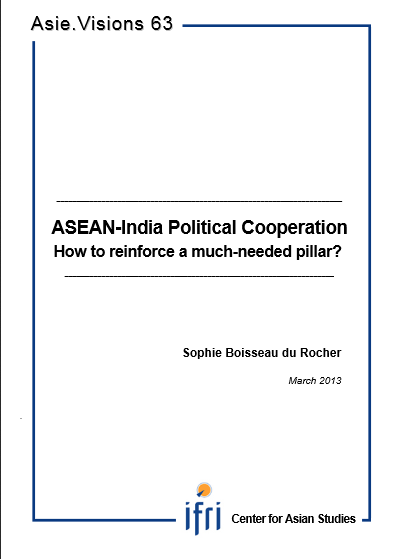ASEAN-India Political Cooperation: How to reinforce a much-needed pillar?

India is one of Southeast Asia’s principal neighbors and there is certainly great potential for cooperation with the region and its institutional representation, ASEAN. But does India properly exploit this opportunity? Is Southeast Asia satisfied with the level of engagement?
The bases for cooperation are strong. Since ancient times India’s soft power has played a unique role in Southeast Asia and has contributed to shaping the region’s political culture. Even if colonialism and the Cold War hampered these links, they have been revived with India’s “Look East Policy” in the early 1990s. The relationship has since gathered momentum and evolved into a broad-level interaction encompassing economic and security pillars.
Nevertheless, this study shows that political linkages remain weak and penalized by the absence of a clear vision. This reality is indeed worrying and there is concern that between rising economic and security imperatives there is no room, no time and no investment for a much needed, constructive political dialogue.
The basic argument of this paper is that the missing political link might be detrimental to the whole relationship. The ASEAN - India framework for political cooperation has no substance and could not play a functional role in case of uncertainty or tensions. In a context of growing competition with China, both India and ASEAN need a reinforced partnership that includes a functional form of political cooperation.

Available in:
Regions and themes
ISBN / ISSN
Share
Download the full analysis
This page contains only a summary of our work. If you would like to have access to all the information from our research on the subject, you can download the full version in PDF format.
ASEAN-India Political Cooperation: How to reinforce a much-needed pillar?
Related centers and programs
Discover our other research centers and programsFind out more
Discover all our analysesJapan’s Takaichi Landslide: A New Face of Power
Prime Minister Sanae Takaichi has turned her exceptional popularity into a historic political victory. The snap elections of February 8 delivered an overwhelming majority for the Liberal Democratic Party (LDP), driven by strong support from young voters, drawn to her iconoclastic and dynamic image, and from conservative voters reassured by her vision of national assertiveness. This popularity lays the foundation for an ambitious strategy on both the domestic and international fronts.
The U.S. Policy Toward Taiwan Beyond Donald Trump: Mapping the American Stakeholders of U.S.-Taiwan Relations
Donald Trump’s return to the White House reintroduced acute uncertainty into the security commitment of the United States (U.S.) to Taiwan. Unlike President Joe Biden, who repeatedly stated the determination to defend Taiwan, President Trump refrains from commenting on the hypothetical U.S. response in the context of a cross-Strait crisis.

China’s Strategy Toward Pacific Island countries: Countering Taiwan and Western Influence
Over the past decade, China has deployed a diplomatic strategy toward the Pacific Island Countries (PICs). This strategy pursues two main objectives: countering Taiwan's diplomatic influence in the region and countering the influence of liberal democracies in what Beijing refers to as the "Global South."

Opening up the G7 to South Korea to Address Contemporary Global Challenges
The G7’s global influence has diminished as powers like China reshape international governance through initiatives such as BRICS and the Shanghai Cooperation Organisation (SCO). With the G7 now representing just 10 per cent of the world’s population and 28 per cent of global GDP, its relevance is increasingly questioned.










